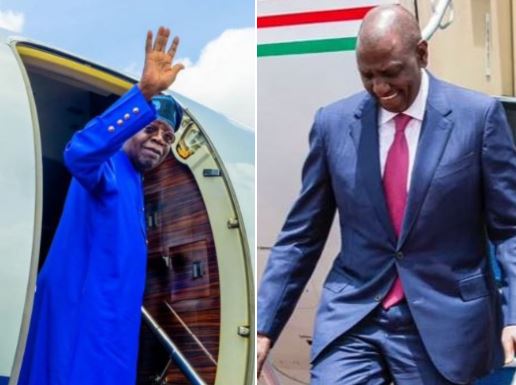Ever since assuming the presidencies of their respective countries, William Ruto of Kenya and Bola Tinubu of Nigeria have faced criticism for their frequent overseas trips.
Ruto, often dubbed the “Flying President” by a Kenyan newspaper, has been scrutinized for the perceived mismatch between the costs associated with his extensive air travel and the challenging economic conditions at home.
Similarly, Tinubu’s recurrent trips, including a recent private visit to Europe, drew disapproval from Nigeria’s opposition leader, Atiku Abubakar, who questioned the necessity of a “tourist-in-chief” amidst national security concerns.
While acknowledging the importance of diplomatic engagements and foreign relations, critics argue that some trips by these leaders are excessive and serve more as personal glorification than genuine national interests.
Ruto and Tinubu defend their travels, asserting their significance in addressing domestic challenges.
Since his inauguration, Tinubu has made 14 trips in eight months, while Ruto, in a more staggering pace, has embarked on approximately 50 journeys abroad since assuming office in 2022.
While diplomatic engagements and attracting foreign investment are cited as justifications, questions persist about the necessity and cost-effectiveness of every trip.
Tinubu’s travel expenses have raised eyebrows, with reports suggesting he spent over 3.4 billion naira ($2.2 million) on domestic and foreign travel in the initial six months of his presidency, surpassing the allocated budget for 2023.
Similarly, Ruto’s extensive travel schedule has prompted concerns about costs, with both leaders facing calls for fiscal responsibility.
In response to the criticism, both Kenya and Nigeria have taken some measures to address travel spending by government officials. Kenya claimed a 50% reduction in its civil service travel budget, while Nigeria announced a 60% reduction in official travel delegations.
However, critics argue that these measures may not be sufficient, and the debate on the frequency, necessity, and costs of presidential trips continues in both nations.
Other African countries, including Congo, Malawi, Uganda, The Gambia, Namibia, and Sierra Leone, have also faced scrutiny and implemented measures to curb travel spending by government officials.





